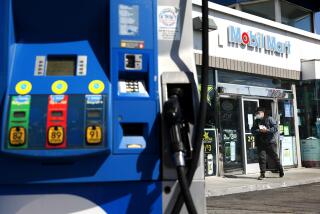Hyundai misleads about Elantra fuel economy, suit says
A consumer watchdog group has joined with a car buyer to file a lawsuit alleging Hyundai Motor America misleads consumers with inflated fuel economy claims for its popular Elantra.
The lawsuit is the second of its type filed recently against an automaker and highlights the aggressive use of mileage numbers by manufacturers in advertising their vehicles.
The litigation also underscores growing consumer frustration over mileage claims as the auto industry has shifted its marketing focus from performance attributes such as horsepower and speed to fuel economy, now among the top features consumers look for when buying a new car.
“This is becoming a customer satisfaction issue,” said Aaron Bragman, an analyst with IHS Automotive. “If you sell them on an attribute they don’t get, it can come back and bite you.”
The latest suit contends that Hyundai pitches its “40 Mile Per Gallon Elantra” without a government-mandated disclosure that the estimate is for highway driving only and that other measures are much lower.
It was filed in Sacramento on behalf of resident Louis Bird, who bought an Elantra last year and kept a mileage log. Bird said most of his driving is on open highways but that he barely gets 29 miles per gallon.
“We are hoping that other car makers will take notice and realize that if you do it wrong, you will have to pay the price,” said Jamie Court, executive director of Santa Monica-based Consumer Watchdog, which jointly filed the suit.
The lawsuit seeks class-action status and wants to stop Hyundai from using gas mileage numbers in its advertising of the Elantra without government-mandated disclosures. It asks for unspecified damages on behalf of California residents who bought or leased 2011 and 2012 Elantras.
Hyundai defended the estimate, noting that it was certified by the Environmental Protection Agency, which publishes fuel economy ratings for all vehicles sold in the U.S.
“Hyundai Motor America believes this case has no merit, as our advertising is accurate and in full compliance with applicable laws and regulations,” the automaker said.
The Hyundai lawsuit follows a settlement of a similar case with AmericanHonda Motor Co.this year. That case involved the fuel economy claims Honda made for its Civic hybrid.
The Honda settlement was estimated at $170 million, with the class-action attorneys receiving $8.5 million and Civic owners who joined the lawsuit getting $100 to $200 each, plus rebate coupons toward a future purchase of a Honda or Acura vehicle. Cuneo, Gilbert & Laduca, aWashington, D.C., firm that specializes in class-action litigation, brought both lawsuits.
The outcome of the Hyundai lawsuit could affect automaker advertising and future litigation, analysts said.
If the law firm is able to score “another $8.5 million this will be a trend that takes off,” said Aaron Jacoby, a Los Angeles defense attorney who heads the automotive industry group at the Arent Fox law firm.
Hyundai, among the most aggressive brands in advertising fuel economy, bases all of its claims on EPA tests that rate the Elantra at 40 mpg on the highway, 29 in city driving and a combined efficiency of 33 mpg. In independent testing Consumer Reports magazine found that the Elantra averaged 20 mpg in city driving, 39 mpg in highway driving and 29 mpg in combined driving.
Critics have long noted flaws with the EPA tests, and even the agency is quick to point out that its ratings should be used to compare vehicles rather than to predict what type of fuel economy an individual driver might experience.
On its own website, the EPA noted that real-world conditions reported by 27 Elantra drivers resulted in an average fuel economy of 30.2 mpg and a range that extended from a low of 20 mpg to a high of 40. The agency did not comment on the Hyundai lawsuit or answer questions about policies regarding how the data are used in advertising.
EPA mileage tests do a poor job of replicating real world driving conditions, according to critics. The agency uses professional drivers who never break a speed limit and operate cars with far more precision than typical drivers. Vehicles are tested inside laboratories on machines called dynamometers rather than on outdoor test tracks. The tests also don’t account for the jack-rabbit starts and quick stops of many drivers that hurt fuel economy.
Hyundai has become a target of consumer frustration because of the way it advertises, said David Champion, who directs Consumer Reports’ auto testing program. It is attracting buyers who care most about fuel economy who are then disappointed if they don’t get what’s billed, either because of the way they drive, where they drive or the aggressive claims by the automaker, he said.
“We will see more examples of this,” Champion said. “Everybody is advertising 40 mpg, but saying that’s for the highway is only in the fine print.”







